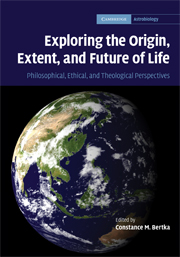 Exploring the Origin, Extent, and Future of Life
Exploring the Origin, Extent, and Future of Life Book contents
- Frontmatter
- Contents
- List of contributors
- Acknowledgements
- 1 Astrobiology in a societal context
- Part I Origin of life
- 2 Emergence and the experimental pursuit of the origin of life
- 3 From Aristotle to Darwin, to Freeman Dyson: changing definitions of life viewed in a historical context
- 4 Philosophical aspects of the origin-of-life problem: the emergence of life and the nature of science
- 5 The origin of terrestrial life: a Christian perspective
- 6 The alpha and the omega: reflections on the origin and future of life from the perspective of Christian theology and ethics
- Part II Extent of life
- Part III Future of life
- Index
- References
4 - Philosophical aspects of the origin-of-life problem: the emergence of life and the nature of science
from Part I - Origin of life
Published online by Cambridge University Press: 29 December 2010
- Frontmatter
- Contents
- List of contributors
- Acknowledgements
- 1 Astrobiology in a societal context
- Part I Origin of life
- 2 Emergence and the experimental pursuit of the origin of life
- 3 From Aristotle to Darwin, to Freeman Dyson: changing definitions of life viewed in a historical context
- 4 Philosophical aspects of the origin-of-life problem: the emergence of life and the nature of science
- 5 The origin of terrestrial life: a Christian perspective
- 6 The alpha and the omega: reflections on the origin and future of life from the perspective of Christian theology and ethics
- Part II Extent of life
- Part III Future of life
- Index
- References
Summary
Introduction
At a public lecture at the Sorbonne in 1864, the renowned French scientist Louis Pasteur raised the fundamental philosophical question pertaining to the origin of life: can matter organize itself to form a living system? Pasteur answered this question with a decisive no. He was referring both to the emergence of life on the primordial Earth and to the possibility of “spontaneous generation” – the formation of living organisms out of matter here and now. Life, Pasteur believed, was originally created by God and organisms are subsequently born only from parents.
Toward the end of the eighteenth century, the German philosopher Immanuel Kant had also pondered the question of the nature of biological organization and its emergence from matter. Unlike other physical objects, Kant noted, an organism is an interactive system in which parts and whole are reciprocally dependent. This circular, self-reproducing nature defines a living system and the critical question is whether we can understand the production of such an organized, functional whole in causal, materialistic terms.
For Kant, the idea of physical principles of self-organization, working mechanistically without any guiding plan and yet capable of producing an organized whole, was inconceivable. Hence, the very possibility of the emergence of life from matter seemed to him absurd. Although not sharing Kant's and Pasteur's convictions, most scientists toward the end of the nineteenth century nevertheless preferred not to deal with the origin-of-life problem.
- Type
- Chapter
- Information
- Exploring the Origin, Extent, and Future of LifePhilosophical, Ethical and Theological Perspectives, pp. 61 - 79Publisher: Cambridge University PressPrint publication year: 2009
References
- 2
- Cited by


